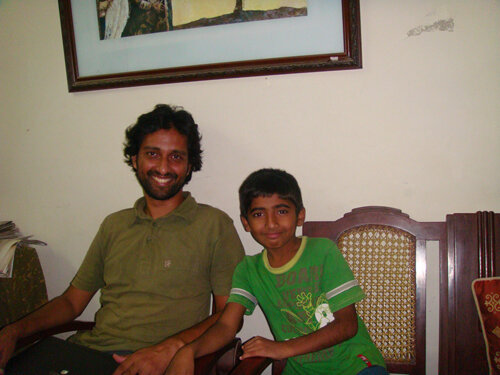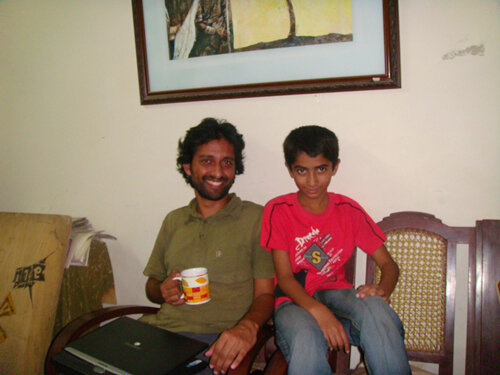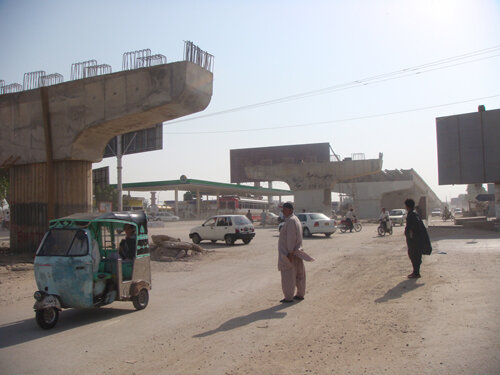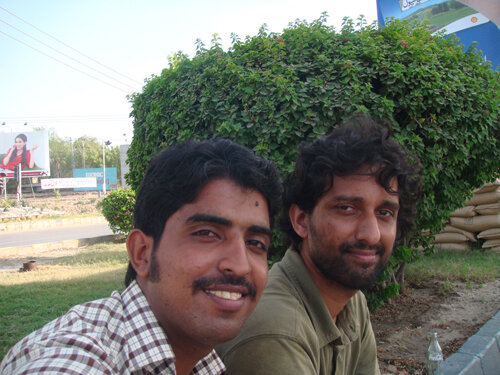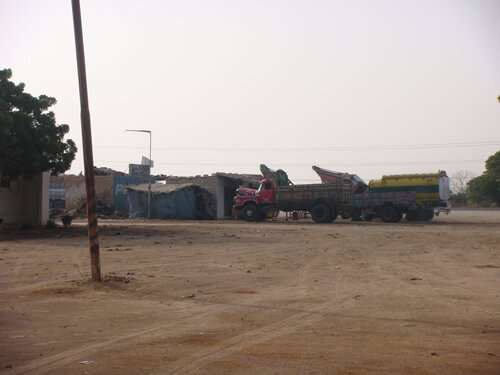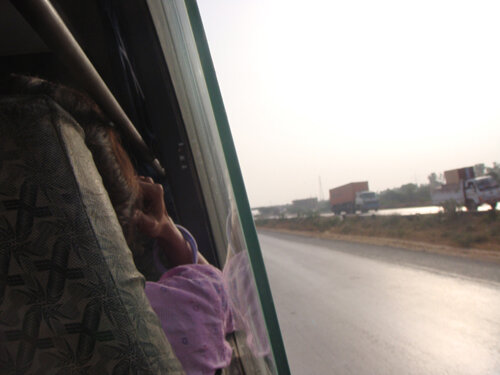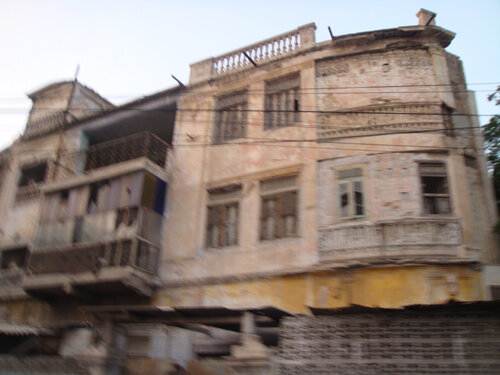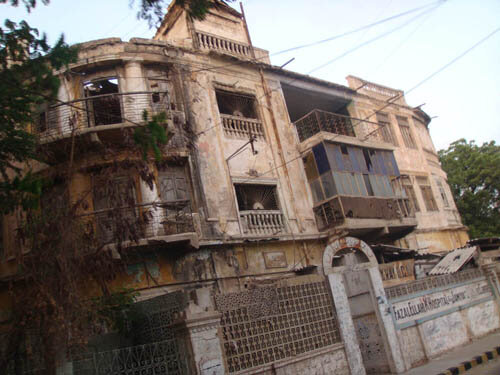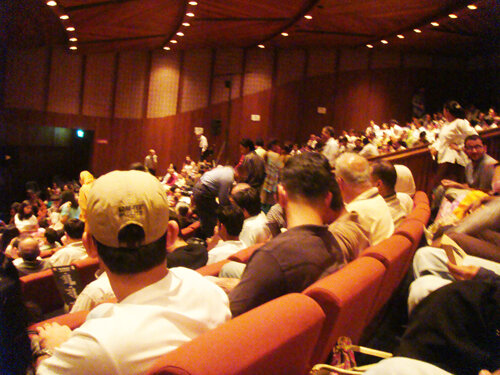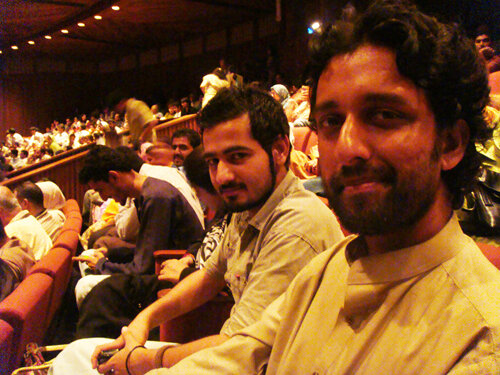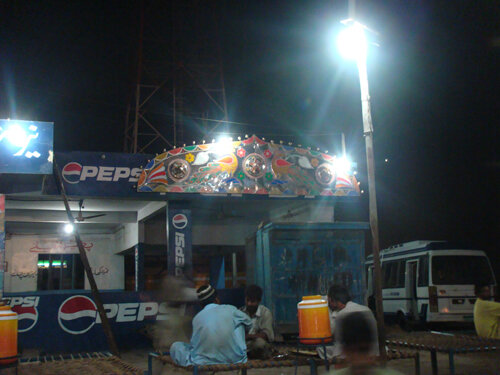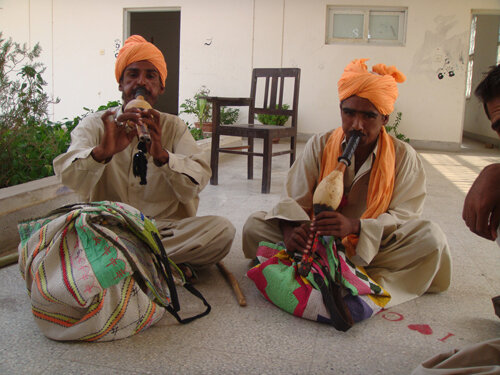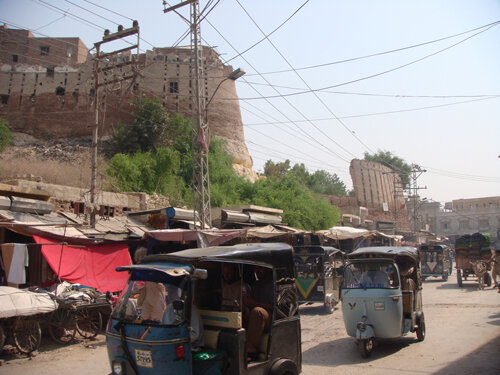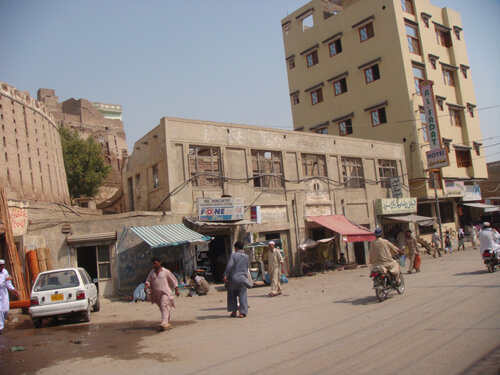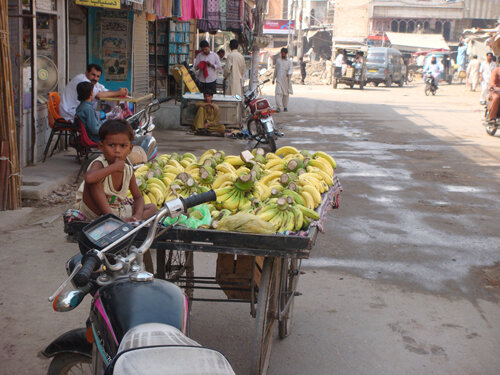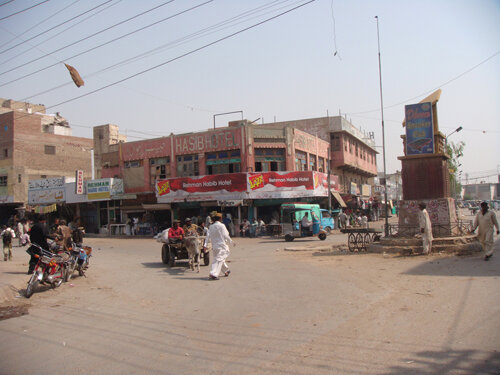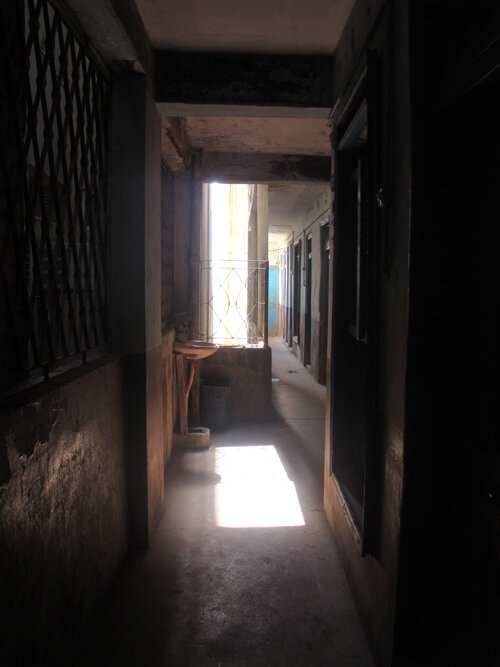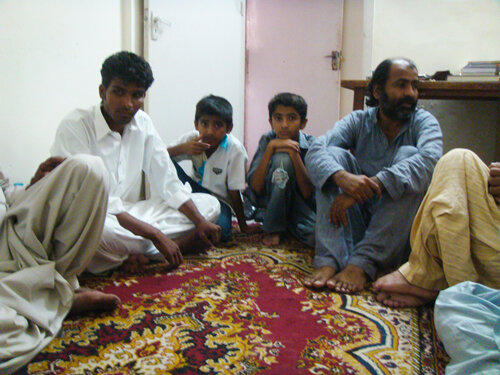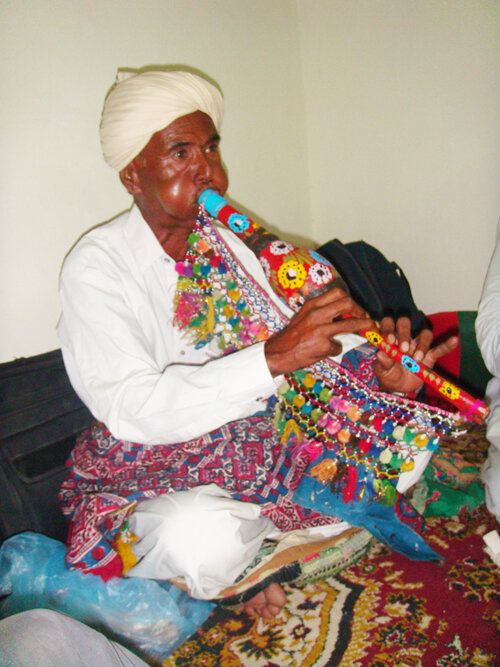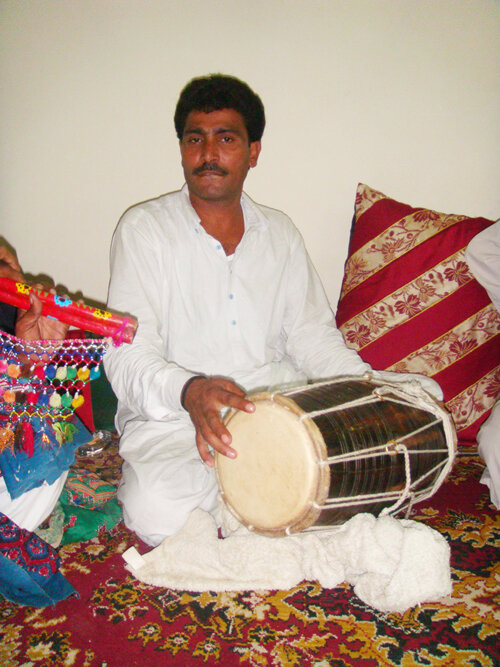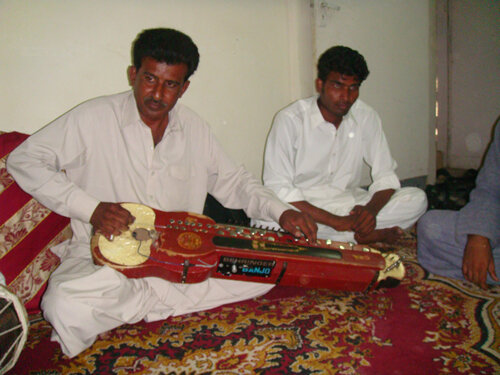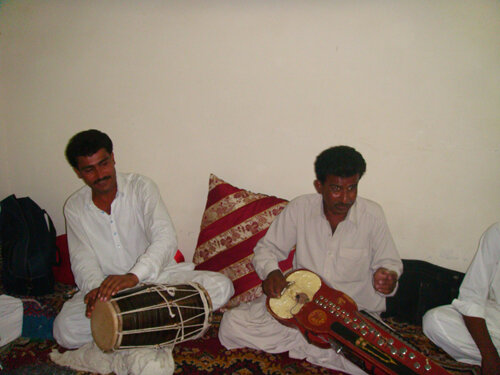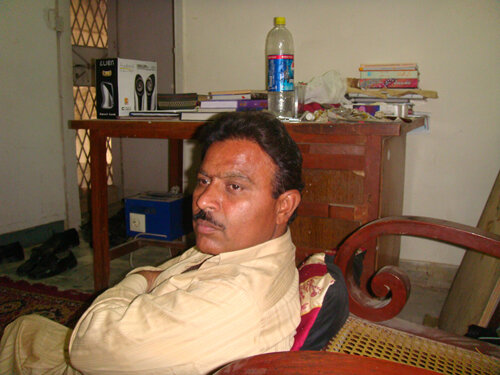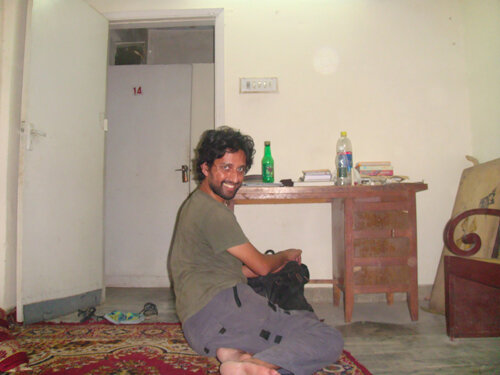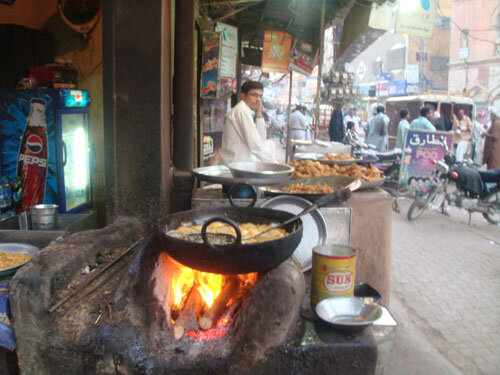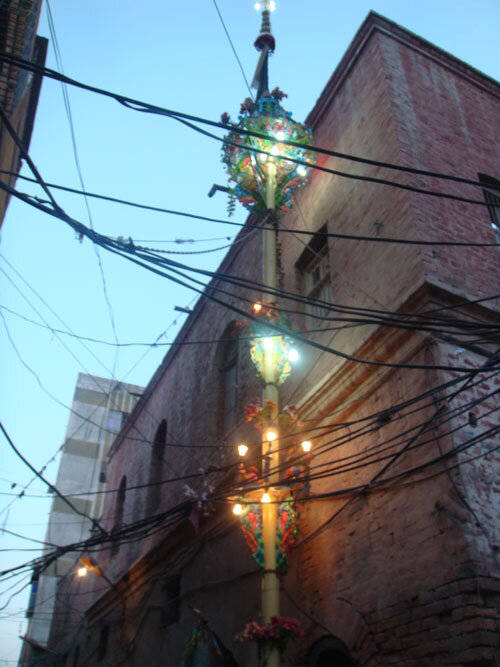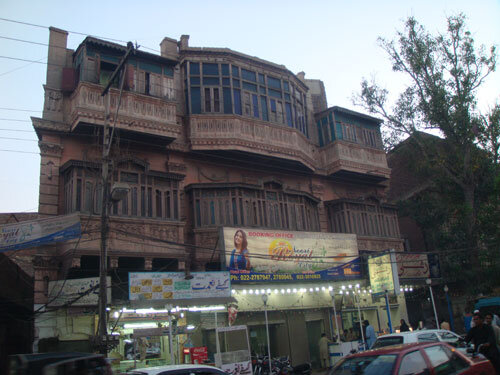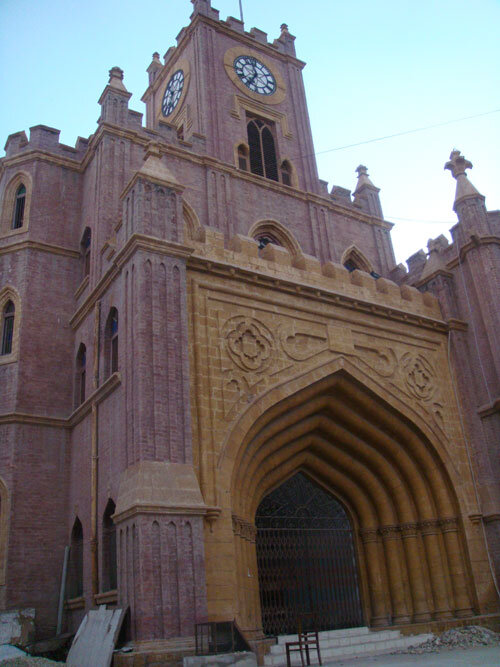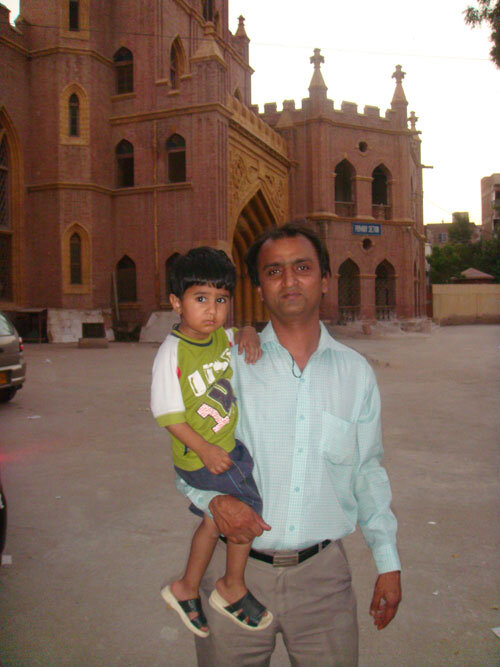1. Going to Sindh - 2. Emperors New Clothes and Sites - 3. Fun Days and Tipping Point - 4. Time Running Out - 5. All Good Now?
Running out of Time
I had little time left, and I was very angry at getting the run around. This second music contact I had basically wanted my time to run out and then have me pay them a large, unknown sum, for music that they would create after I was gone. He could not even play something basic to indicate what he had in mind. It was only thanks to Suffi sahib, sitting in Lahore, who kept calling his old college friends in Sindh to come and meet me, that I did not turn back empty handed.
The first of Suffi's friends to come to my aid was Fatah Daudpoto sahib. He is an incredible artist, professor and activist. He is a man of many extraordinary talents, and a purist when it comes to his art and his dealings with people. He gave me a call at Suffi's request and came over soon after on his motorcycle. I showed him an as yet uncolored version of my film on my laptop, with some of Iqbal Jogi's music as temp music. He immediately understood what I was after, and took me out to some music stores to show me some proper Sindhi folk music tapes and CDs. He had recorded a folk album of his own and shared that with me. Things were still uncertain, and time was limited, but here was a new friend, who not only had a great respect for the type of music I sought, but also had invested himself in my purpose.We began a process of visiting TV stations and contacts to seek out the music I was after. Most times the conversations were all in the local language, Sindhi (which I don't understand) instead of Urdu, which is the national language (which I know well). It is not that the people we met did not know Urdu, but rather that people like to speak in their own language which is understandable, but it also cut me out of the process. It was frustrating, but all I could do was trust in Fatah sahib, whom I trusted completely, but I also knew that in the end, it was my responsibility to get it done.Fatah sahib freed me of the music building, where the hosts were very kind and hospitable, but the owners clearly had an agenda of their own. I was graciously welcomed into Fatah sahib's home, and I went with him in the mornings to CEAD (Center of Excellence in Art and Design) and worked with his multimedia graduate students. I loved working with the students. They were bright, talented and very hard working. That's all that Fatah sahib asked and it was truly a pleasure.It was through this group that I was able to go to the Rama Pir Mela (a festival in remembrance of a Hindu saint who worked primarily in service of the poor) in a nearby town, and visited a beautiful Mandir and saw the Hindu community of the area celebrate in their beautiful clothes. I had visited many of the other minority communities in Lahore in the previous month, but had been told that Sindh was the place to meet the Hindu community. Fatah sahib and a group of students took me along and it was really great to see how much his students enjoyed the experience too.I ended up staying at the student hostel at one point at the request of the students. The warmth and hospitality of the students far outweighs anything that I could give them. In particular, one student named Azam Bugti, became a good friend of mine. I was working with him on After Effects for broadcast design and he joined me for my adventures out and about, trying to get my music going. We went to the Institute of Sindhology several times and met with another friend of Suffi sahib, named Saeed Mangi. Saeed Mangi runs the Sindhology Museum, which is a beautiful museum of Sindhi culture, with displays and artifacts, constantly updated and expanding under him and his wonderful team.Mangi sahib was very hospitable and we quickly became friends too. He is a talented illustrator and has a great love of animation and a real sense of ethics and respect for people. In college, his thesis was an ambitious, hand drawn animated short about Karo Kari (the horrible issue of so called “honor” killing). Sindhology, besides being a library and museum has a simple recording studio, where Zulfi Gopang sahib was at the time the recording engineer and is now in charge. The recording studio, and the entire department is headed by Mohammad Qasim Maka sahib, who has a record label that preserves and supports Sindhi folk musicians. I knew I was getting closer to my goal, but getting all the pieces to come together was still out of reach and would require a lot of things to come together in a very short amount of time. So much was out of my hands, and that was a big problem.Meanwhile, Fatah sahib would take me to different people every evening and after a long conversation in Sindhi, I would be asked a few questions, and get some information. I really had nothing to do with this side of the process, no matter how I tried to get involved in the conversations. Finding the musicians was solely thanks to Fatah sahib's efforts. He took time out from his family and life to be there for me. Eventually Fatah sahib and I met a wonderful dholak player named Ustad Aachar.During this process, Fatah sahib was feeling ill at this point and being a man who does so much really was not helping any. He stopped coming to CEAD, and I was staying with students for and then Mangi sahib. We were all concerned for his health. One day he magically appeared, but he was in terrible shape. I did not want to bother him. There were some Jogis who are traditionally snake charmers, wandering by the campus, and so we invited them inside. The students loved it, and everyone was very interested in sitting around them, talking and observing. They were very nice and answered all kinds of questions about handling snakes, and then they played some music to a very drugged out snake. The quality of their music was not very good, but I appreciated them for coming. I told them a bit about what I do, and showed some of the animation work to them, out of respect to my fellow artists. Afterwards, I paid them, ran over and got some water that in traditional Sindhi style we all shared a single glass. I realize that health wise, it's not the best idea to share cooties, but there are times when that is how you show respect.It was great to see them, but I was not any closer to what I needed. They gave me the contact of their teacher and head on out into the desert. Azam Bugti came up to me and said that Fatah sahib had instructed us to go to the train station. Incomplete instructions in hand, we head out. It turned out that Fatah sahib, had arranged a meeting. He had Azam Bugti and I go pick up some musicians at the train station. I met Ustad Anb Jogi and Jairam Jogi at a small hotel by the Hyderabad rail station. I was nervous and also cautiously excited. They were both very friendly. We went over and grabbed some food at a local restaurant and spoke for a bit. Afterwards, we got their instruments and got ready to head to Fatah Sahib’s place. It would be a tight fit, so I offered to hire two rickshaws for us, but these men were so sweet, that although I was paying for it, they still insisted that one rickshaw was enough. Thanks to their humility, yes it was enough. We squeezed in the front and back with these wonderful instruments. This was very different than the other music contacts I met. They put on no airs and they were genuinely interested in how they could apply their music.In Fatah sahib’s apartment, we met with Ustad Aachar, the dholak player we had met earlier and a Banjo player. The musicians introduced themselves and I gave an intro of myself, before Fatah sahib handed it over to me to at last communicate what I needed. He had made it possible for this meeting to occur. We sat and spoke. I showed them a rough cut of the film with Iqbal Jogi’s music. I explained the emotions of the story and also what it was that I needed from them. I played some of the other music I had brought to give them a sense of what kinds of Sindhi folk music I was thinking about. They played bits of music to demonstrate how they might handle various emotions. It was all very spontaneous, but as soon as I heard those first notes, my heart filled with nervous excitment, and I knew for certain that this whole thing was possible. I asked if they needed rehearsal time or anything, but Ustad Anb Jogi reassured me that I need just let them know when and where to show up, and they would do the work then.Again, I really must give credit to Fatah sahib and Suffi sahib. They didn’t owe me anything, and yet took great pains to help me. Fatah sahib instructed me on etiquette as far as paying travel expenses etc before hand, which I gladly took care of. These were real musicians. This was a truly great group of musicians who brought an energy and life to the air the moment they began to play. I was instantly humbled by their musicianship as well as their lack of any sort of pretense. After the rest of this process, I will never forget that.1. Going to Sindh - 2. Emperors New Clothes and Sites - 3. Fun Days and Tipping Point - 4. Time Running Out - 5. All Good Now?
